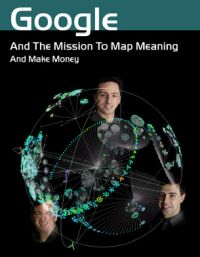Tuesday, February 15, 2005
Google and the Mission to Map Meaning and Make Money (Book)

Google and the Mission to Map Meaning and Make Money is the title of a new book on Google by Bart Milner. According to the publisher, the book is “a 288-page indexed paperback with illustrations by Doonesbury, Dilbert and Tenniel and more than 500 online reference links” and “a brief history of cyberspace – the biography of a technology and the critical breakthrough made by Google that is already shaping the way the 21st century thinks.”
The first chapter of the book is available for you to read online, and I had a chance to check the whole book. (Once you purchase the book, you too can access the online version, and also follow-up on the 500 reference links.) While I’m waiting for the offline version for a more in-depth review – I can’t wait to read the book, which should be the first covering the story of Google – I’ll leave you with a quote from chapter 7; “Before Google there was...um, AltaVista”:
“It was not Sir Tim Berners-Lee fault, but by 1995 his invention, HTML, which made it easy for one web page to be read by millions, was so cheap and so fast that the Internet was out of control. Not the underlying network, which was coping magnificently, most of the time, but the sheer volume of pages had made it impossible to retrieve anything unless you knew exactly what you were looking for. Simple URL addresses (most famously sex.com) were valued in millions simply because they were easy to remember and find.
There were lots of indexes of the actual words that appeared on web pages, especially their invisible metatags, but these were becoming less and less useful as millions more new pages were added. The Internet soon came to resemble (what I remembered as) the lost library of Ultima Thule – millions of documents in a completely random order, with no index of titles, many indeed with no titles, author, source, or dates. (...)
Younger readers (who may have been using the Internet that much longer) may remember when AltaVista was the dominant search engine before Google. (...) Before Brin and Page presented their architecture in 1997, the usual suggestion was that you just keep adding new keywords until your search produced results. They completely rejected this approach, on the solid ground that users should not have to learn to compensate for bad design. This is now part of Google’s legacy; if you add too many keywords to your search in Google, it does not return thousands of partial matches, it returns a ’nothing found’ screen.”
>> More posts
Advertisement
This site unofficially covers Google™ and more with some rights reserved. Join our forum!
